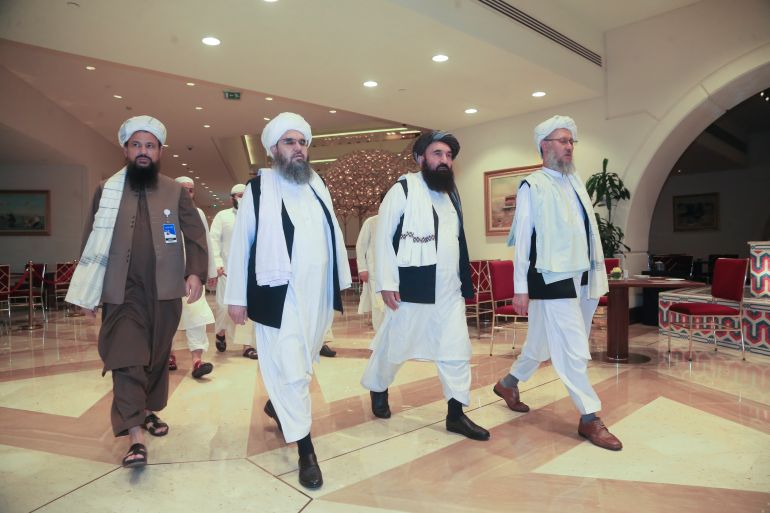Taliban delegation holds talks with EU, US diplomats in Doha
Western envoys meet Taliban members as the group seeks recognition and badly-needed funds amid a humanitarian crisis.

Doha, Qatar – Representatives of the European Union and the United States have met Taliban members as the group seeks to unlock fundings to tackle Afghanistan’s dire humanitarian crisis.
The Afghan delegation led by acting Foreign Minister Amir Khan Muttaqi on Wednesday held the second day of talks with diplomats from 16 European countries in the Qatari capital, Doha.
Keep reading
list of 4 itemsIs a rift between Pakistan and the Afghan Taliban imminent?
Qatar reaches deal with Taliban to resume evacuations: Report
Two women start eatery in Albania to help Afghans feel at home
“All participants pledged to make all possible efforts for the overall well-being of the Afghan people,” read a statement issued by the Taliban, adding that the international community is ready to take “effective steps in the field of humanitarian assistance”.
The statement though did not provide any specific details about the steps to be taken by the international community.
Thomas Niklasson, EU special representative for Afghanistan, who also attended the talks, said that the bloc remains committed to delivering 500 million euro ($569m) in assistance through the UN and humanitarian organisations.
The EU remains committed to the Afghan people and is delivering 500 million euros in assistance through UN and NGOs focusing on food, health, WASH and protection, education and livelihood. The two delegations agreed to continue the dialogue through physical and virtual meetings.
— Tomas Niklasson (@tomas_niklasson) February 15, 2022
The Taliban is still not recognised by any country and many of its senior officials are still under Western and UN sanctions. The country is also cut off from international financial institutions, which has triggered a banking crisis.
The talks came weeks after the armed group met Western diplomats in the Norwegian capital Oslo during which the issue of human rights and the need for humanitarian aid was discussed.
Niklasson in a Twitter post added that the Taliban expressed “commitment to open primary and secondary schools for boys and girls throughout the country no later than March”.
The Taliban-led government is gripped with a fast-deteriorating humanitarian crisis with 97 percent of the population at the risk of sinking below the poverty line, according to UNDP’s projection.
The group, which seized power in August last year by toppling the Western-backed government of President Ashraf Ghani, is also seeking to unfreeze billions of dollars of money by the West.
But Western countries and international financial institution have linked their release to the improvement of the country’s human rights record, especially regarding women.
Last week, US President Joe Biden said that some $7bn in Afghan reserves held in the US would be split between a fund to aid Afghanistan and to compensate victims of the September 11, 2001 attacks.
“It is not acceptable for the US to spend this money on humanitarian aid or compensation,” Mottaqi said in a statement issued on Wednesday.
Millions of dollars in aid pledged by the West will be channelled through a special mechanism, which means the fund will not go through the government departments.
While the Taliban have repeatedly emphasised exercising a softer rule compared with their previous stint in power from 1996 to 2001, restrictions on women still remain in force.
Women have been barred from working in a number of sectors and high school girls are still not allowed to attend classes. Though the Taliban has promised the return of girls of all ages to schools by the end of next month.
The talks come a day after ambassadors from the six GCC Gulf states raised the issue of women’s right to work and study in their meeting with the Taliban delegation.